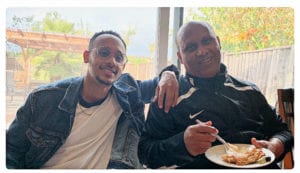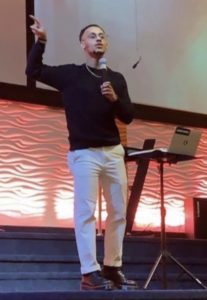

Situated in the heart of California’s Silicon Valley, KCulture Church, an emerging church plant in the Pacific District Conference (PDC), reaches a global audience—from the United Kingdom to South Africa to Australia and across the United States.
With a strategy patterned after the technology giants he’s surrounded by, church planter and pastor Moni Worku has cast a vision for a church that focuses less on what happens within the four walls of a building and more on broadcasting a message via social media.
“Are we a different church? Yes,” Worku says. “Does my vision scare a lot of people? Absolutely. Because it’s never been done before. But great influence comes with something that is different.
“We’re not changing the message,” Worku says. “We’re changing the method of how things are done.”
About KCulture Church
Unlike most churches, which meet together in one location on Sunday—except during a pandemic—KCulture Church broadcasts its services on YouTube, with additional content on Instagram and TikTok.
Geared toward individuals ages 18-40, KCulture services include a welcome, worship, announcements, an invitation to give via PayPal or Cash App and a sermon.
And people around the world are tuning in.
“It’s a global church from the launch,” says Brian Wiebe, chair of the PDC Board of Home Mission. “I’ve never seen or experienced anything like this. I really don’t know how to coach (Moni). All I can do is encourage him. It’s just awesome.”
The church is still in the pre-launch stage, and Wiebe says the timeline is moving so quickly that the PDC has not yet officially adopted the project but intends to do so. Worku, who is
in the licensing process, received full approval at a church planters’ assessment in Orlando.
The “K” in KCulture stands for “kingdom.”
“Because we are mainly on social media and we’re really riding this technology wave, it allows for our church to be in multiple places at the same time,” Worku says. “It’s helping us expand the kingdom of God.”
Sharing Jesus with the world
Worku, a first-generation American whose parents immigrated to the U.S. from Ethiopia, wasn’t always set on planting a church or even pursuing full-time ministry.

As a student in nursing school in Olathe, Kanwas, Worku fell in love with Jesus. So he called his uncle, Tariku Sharku, who serves as associate pastor at Ethiopian Christian Fellowship (ECF), a USMB congregation in Santa Clara, California, to express his desire to learn about Jesus and tell the world about him.
Sharku advised Worku to pray, and, after a year, upon seeing Worku’s conviction, invited him to move to California. So Worku left nursing school and moved to California to pursue a Christian leadership degree at William Jessup University, which he completed in 2019.
Under the mentorship of Sharku, Worku began serving at ECF, organizing music, teaching the youth group and inviting young people to San Jose for a Cultivate Conference.
“A lot of people came to Christ,” Sharku says. “We baptized two times, I think, in that year, so (Worku) did a great job. There are many things he did well. He’s a visionary.”
Worku also started a young adults ministry, calling it Kingdom Culture, for those who might not fit with ECF’s service in Amharic.
Then the pandemic hit, and church leaders decided to quit meeting in person.
“I didn’t know which direction to go with the young adults ministry,” Worku says. “A lot of young adults were stuck at home, and it was really hard to pastor people.”
After praying about it, Worku started a 30-day devotional on Instagram Live in April 2020. During the hour-long video, Worku shared how the gospel had impacted his life.
“(The Lord) painted a picture for me,” Worku says. “He was like, ‘Look, everyone’s on social media now that they’re quarantining. This is where the fish are at.’”
As individuals shared the devotionals in group chats, DMs and via text, more people began tuning in—first 25, then 45, then close to 60 on Easter Sunday, six of whom accepted Jesus, Worku says. By the end of the 30 days, 100 people were participating.
“I was preaching something good and real and it resonated with people,” Worku says.
Worku then taught a three-month leadership and discipleship course online, whose 20 participants Worku discipled to serve as leaders of weekly local Bible studies. But although lives were being transformed, Worku says it took being in a car accident in September to shake his complacency.
“That was like a wakeup call,” he says. “It put a sense of urgency in me to trust and have faith in God more. I took a week off to pray and ask God, ‘All right, what do you want to do next?’”
Wanting to see something greater happen, Worku says he asked God to make him uncomfortable like he had been in April.
“(God) said, ‘Out of this pandemic, you cannot be the same person you were before this pandemic,’ that he was doing something new, something fresh, something different in my generation,” Worku says. “He told me to embrace the difference.”
Social media and innovation
Desiring to share the Gospel with more people, Worku formulated a strategy similar to how technology giants globalize their products.
“They’re completely doing the opposite of what the church is doing,” Worku says. “Whenever they have a product, their perspective is always global. The church is always thinking small, in the four walls, this ‘us’ mentality. That’s not how Apple operates. That’s why they’ve been able to have great influence in the world. I’m a firm believer that the church can do that in today’s age.”
By the end of 2020, Worku told ECF leaders he was ready to plant a church—initially on Zoom before transitioning to YouTube—whose mission was “to create the culture of heaven on earth to expand the kingdom of God so that all lives see the goodness of Jesus.”
ECF pastor Sharku discussed the vision with church elders, wanting to ensure Worku’s approach was biblical and could incorporate discipleship, worshipping in person, the Lord’s Supper, mission and fellowship. Sharku helped Worku formulate a plan for discipleship through local Bible studies led by trained leaders in each location.
“I told (the elders), ‘I don’t know where he’s going, but when I compare him with other churches, his way of trying to serve other people is better than us,’” Sharku says of Worku’s approach to social media. “He was exploring, but one of the things that I told the church elders was, ‘Let’s be with him.’”
Simplifying the message
After passing his church planter’s assessment, Worku did a mini launch service for KCulture Church on Zoom.


Worku has assembled a team of 12 creatives, including a community outreach person in Maryland, a church administrator in Texas and a number of others in San Jose. He records and edits messages during the week with help from his girlfriend before posting services on YouTube on Sunday. He is still solidifying a worship team, and until then is incorporating worship songs from YouTube. He hopes to film IG Live videos and Tiktok dances to help spread the message and tell Bible stories.
In a culture that thrives on efficiency, Worku says it is important to condense the message to cater to his audience’s shorter attention span.
“They don’t want you to take a long time explaining a concept,” Worku says. “They just want you to break it down, simplify and get it to them. That’s why Tiktok is going crazy right now. The smaller the content and the more specific you are, the more influence you have.”
As California continues to lift COVID-19 restrictions on in-person gatherings, Worku hopes to record Sunday church services in a studio with a live audience, much like what would be done for the recording of a music video.
Discipleship and community
If Sundays are focused on the video production of the church service, Monday through Saturday is where people are rooted in faith in community through discipleship and leadership development.
“Sunday service does not create community,” Worku says. “The sooner we learn that, the better. Because people are still saying, ‘I’m not heard. No one knows me.’ And that’s because we’ve strayed away from the biblical concept of church. If anything, that’s what the pandemic has taught us is we need each other. But it’s also exposed us, because we don’t just need each other on Sundays, we need each other every day.”
If a person accepts Jesus during a Sunday service, Worku invites that person to bring a friend to a Bible study on Zoom, with the hope that people in the same location can begin meeting in person to study and watch the service on YouTube on Sunday.
“In your house, there’s three of you, and that’s the church of God right there,” Worku says. “It doesn’t need to be this big thing. Acts 2 says they were gathering in homes, breaking bread, praying together and that was a church.”
Future plans
With between 40 and 50 people connected and tuning in regularly, KCulture Church started women’s and men’s Bible studies on Zoom at the end of April and early May.
Worku plans to host a conference in San Jose July 29 through Aug. 1 for the hard launch of KCulture Church, where he intends to have a live audience participate during filming of a service.
Although he is currently bivocational, working security for a tech company, Worku says he intends to transition to full-time pastoral ministry and would like to pursue a master’s degree in global leadership.
“Coming out of an Ethiopian culture, my greatest fear was for me to be limited to one culture, but by his grace, we are able to make it a multi-ethnic and multicultural church,” Worku says. “We have African Americans, Hispanics, Ethiopians, caucasians. We’re all over the place and I love it because it really paints an amazing picture of the kingdom of God.”


Janae Rempel Shafer is the Christian Leader associate editor. She joined the CL staff in September 2017 with six years of experience as a professional journalist. Shafer is an award-winning writer, having received three 2016 Kansas Press Association Awards of Excellence and an Evangelical Press Association Higher Goals award in 2022. Shafer graduated from Tabor College in 2010 with a bachelor of arts in Communications/Journalism and Biblical/Religious Studies. She and her husband, Austin, attend Ridgepoint Church in Wichita, Kansas.


















